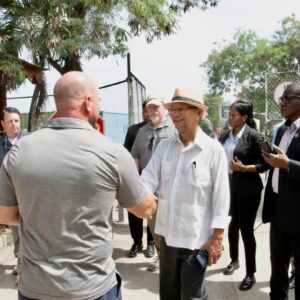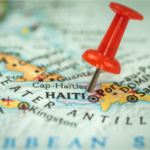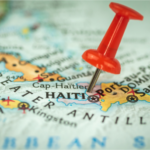How can we think about addressing the problem of insecurity in Haiti’s neighborhoods today without real public policies focused on sport?
Haiti has been going through a multifaceted crisis for several years now. This crisis, which took on another dimension with the assassination of the former President of the Republic, Jovenel Moïseon the night of July 6-7, 2021, has become more complex in recent months due to gang violence leading to the resignation of former de facto Prime Minister Ariel Henry.
After several days of procrastinationthe Presidential Transitional Council (CPT) which took the reins of the country to fill the vacancy observed in the highest magistracy of the State, since the death of the President, has decided to appoint a new Prime Minister, Gary Conille, to replace Mr. Henry.
Prime Minister Garry Conille received a copy of the order of his appointment on Monday, June 3, 2024, at the Villa d’Acceuil, in Musseau. | © Jean Feguens Regala/AyiboPost
In view of the many challenges of the moment, voices, some very important ones, are beginning to be seriously raised to demand a reduction in the number of ministries called upon to make up the next ministerial cabinet.
In this perspective, the Ministry responsible for Sports is particularly targeted. The current priorities being Security, Peace, Justice, Economy, Elections… there would therefore be no place for sport.
This thought, which seems to be dominant in public opinion, does not take into account either current issues or what sport is, in reality. This is exactly what we will try to demonstrate in this article.
Haiti, a country in crisis…
If there is something that does not need to be demonstrated so much, it is obvious, it is the execrable situation in which Haiti finds itself at the moment. A crisis that is getting worse every day, taking on unimaginable proportions.
Of all these crises, the one related to security is undoubtedly the most worrying. Because, not only does it influence other realities, but it also greatly threatens lives and property and with them, the very existence of our State.
Read also: Gangs hack PNH communications radios
According to a UN report, cited in an article published on the Institution’s website, Haiti is in the grip of a cataclysmic situation.
According to the UN High Commissioner for Human Rights, also quoted: “Gang violence left 4,451 people dead and 1,668 injured last year. And in the first three months of 2024 alone, up to March 22, 1,554 people were killed and 826 injured.” As we approach the beginning of June, these figures are expected to trend in the wrong direction, as nothing concrete has been done so far to stem the bleeding.
Added to this security crisis are health, social, economic, political, identity and other crises, which make the daily lives of Haitians very difficult, even unbearable. Which obviously opens the way to a migration crisis. Between internal displacements and those who attempt to leave for abroad, by various and varied means, the country is also losing part of its youth and its intelligentsia, therefore, its lifeblood.
It is therefore in this apocalyptic context – and the word is not too strong – that current and future leaders must and will have to assume their heavy responsibilities.
Faced with this immense challenge, they want to make big decisions right away. In their eyes, sidelining the Ministry of Sports seems to be one of them. Which is in many ways, if not all, a “big mistake”.
Sport, an instrument for development and peace…
One of the first reasons put forward to justify this announced death of the Ministry responsible for Sports from national priorities for the next two years is because it would not fit in with the other MAJOR PRIORITIES which are Security, National Defense and Economic Recovery.
However, since 2015, a United Nations resolution has recognized sport as an important partner in sustainable development. This is in line with the initial conviction of the International Olympic Committee (IOC) since its creation in 1894 that sport could contribute to development and peace in the world.
Hence the notion of the Olympic truce (which begins seven days before the games and ends seven days after the games), dating back to Antiquity (8th century BC), which consists of the cessation of all hostilities during the period of the Olympic Games.
However, since 2015, a United Nations resolution has recognized sport as an important partner in sustainable development.
Since 1993, the UN General Assembly has supported the IOC by adopting every two years – one year before the Games – a resolution entitled: “Building a peaceful and better world through sport and the Olympic ideal.”
Beyond these theoretical considerations that some would be tempted to minimize, Sport has already demonstrated in contexts as difficult as ours that it is capable of validly playing its role, of being this excellent tool for reconciliation, peace and social cohesion.
The rainbow nation of South Africa, once torn apart by apartheid, was born through sport, at the Rugby World Cup in 1995.
What prompted Nelson Mandela to say many years later (in 2000): “ Sport has the power to change the world. It has the power to unite people in a way that is almost unique. Sport can create hope where there was only despair. It is more powerful than governments in breaking down racial barriers. Sport plays on all types of discrimination. ».
This vision, which could be described as idealistic, is above all that of a man who had understood, through his personal experience, the immense power of sport.
Sport has already demonstrated in contexts as difficult as ours that it is capable of validly playing its role, of being this excellent tool for reconciliation, peace and social cohesion.
Ivory Coast, divided in two by a rebellion, saw its reunification process accelerated thanks to a football match organized in Bouaké in the north of the country in which its legend Didier Drogba took part.
Today, if Côte d’Ivoire is one of the most stable countries in Africa; if this country is the one that has recorded the strongest growth in its prosperity on a global level, between 2011 and 2021, it is largely due to this peace effort made possible thanks to sport.
George Weah, former President of Liberia, used his football fame to unite athletes in his country, which was emerging from a long and painful civil war.
We will focus on these three examples, but we could easily cite others, as there are so many of them in this case.
Sport, a vector for social advancement, integration and awareness…
In addition to its virtues in terms of sustainable development and peace, sport also plays the role of social elevator and vector of integration and awareness.
In many countries, sports programmes are a factor in the integration of young people from disadvantaged backgrounds and/or immigrants. France, England, Germany, Brazil, etc. are living examples of this.
In 2015, the World Bank and the Novak Djokovic Foundation established a partnership for early childhood development that emphasized the importance of the first months of life and the need to invest in helping disadvantaged children in Serbia. Needless to say, sport is at the heart of these actions, because we are talking about one of the greatest athletes in history.
Sport is a tool for women’s empowerment (SDG 5).
In this regard, one could note the initiative for the education and empowerment of adolescent girls in Nigeria which uses sports competition to change socio-cultural representations and norms and eliminate barriers to girls’ schooling.
In addition to its virtues in terms of sustainable development and peace, sport also plays the role of social elevator and vector of integration and awareness.
In Haiti, we see every day, through the exhilarating performances of our national football team for people with disabilities and our talented women — with Melchie Daelle Dumornay at the forefront — that sport is capable of bringing people out of social invisibility to make them valiant ambassadors of the country.
So why should sport keep its ministry?
After all the considerations made subsequently, how can we think of addressing today the problem of insecurity coming from the neighborhoods in Haiti without real public policies focused on sports? Are there really Haitian intelligences who think that tanks, helicopters, rifles, soldiers and ammunition will be enough?
It may be said that it is not necessary to have a Ministry of Sports to implement an effective public policy focused on sports? This is not wrong at first glance. While we are at it, let us also eliminate the Ministry of Public Health, the Ministry of the Environment, or even the Ministry of Justice or Planning… Let us stick to this implacable logic, because we do not need these ministries to implement good public policies, in health, environmental, judicial or cooperation matters.
Are there really Haitian intelligences who think that tanks, helicopters, rifles, soldiers and ammunition will be enough?
Beyond the field of activity of a ministry, it is necessary to have in the symbolism, the interest that the State grants it. Eliminating the Ministry responsible for Sports in the current context would amount to saying that sport is not an essential component of Haitian life and that we can easily do without it; whereas conversely, keeping it would send a clear signal that the Haitian State no longer intends to minimize sport and that it finally understands its many dimensions, particularly its capacity to generate a social and economic impact. For this, it is necessary to think a lot about the development of the sector than about its extinction.
Read also: What the cultural deficit in schools costs Haitians
Rémy Rioux, Director of the French Development Agency (AFD) said, and he is right, that sport can be a formidable accelerator of development and social cohesion, on the condition that we think together about “sport and development”, that is to say by putting sport in development, and development in sport, while working very seriously and without naivety to seek the maximum social and environmental impact.
It will take intelligence to articulate all this well, but it is certainly not by depriving sport of this ministry which is not its own since it already shares it with “Youth” and “Civic Action”.
Par Nathan Laguerreoff.
Sportscaster
Specialist in Sports Law
President of the Haitian Center for Development t you sports
Cover image edited by AyiboPost illustrating information according to which the Ministry of Youth, Sports and Civic Action (MJSAC) is in the sights of the appointed Prime Minister, Garry Conille, as a ministry to be removed from his government.
Check out this AyiboPost report on the first edition of the Kako’s Kids interschool tournament, won by the Lycée national de La Saline, an institution relocated due to insecurity in its area:
Stay in touch with AyiboPost via:
► Our channel Telegram : Click here
► Our Channel WhatsApp : Click here
► Our CommunityWhatsApp: Click here



